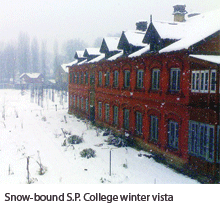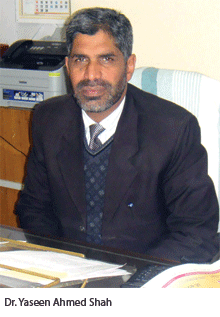Spread over 14.56 acres in the heart of scenic Srinagar, this institution’s contribution to the socio-economic progress of Jammu & Kashmir through its thousands of alumni is immense
 Established in scenic Srinagar in 1905, Sri Pratap College is a pioneer higher education institution of monumental importance and historical significance in the Kashmir division of the state of Jammu & Kashmir. Spread over an area of 14.56 acres in the heart of Srinagar, S.P. College’s contribution to the socio-economic progress of the state through its thousands of alumni over the past century is immense. Notable among them are leaders of India’s freedom movement and J&K’s first chief minister Sheikh Mohd. Abdullah, his son and incumbent Union minister for new and renewable energy, Dr. Farooq Abdullah (also a three-term chief minister of the state), Mufti Mohd. Sayeed (former Union home minister and a former chief minister), Ghulam Nabi Azad (currently Union minister for health & family welfare), former chief of army staff, Gen. O.P. Malhotra, and renowned diplomat T.N. Kaul, among others.
Established in scenic Srinagar in 1905, Sri Pratap College is a pioneer higher education institution of monumental importance and historical significance in the Kashmir division of the state of Jammu & Kashmir. Spread over an area of 14.56 acres in the heart of Srinagar, S.P. College’s contribution to the socio-economic progress of the state through its thousands of alumni over the past century is immense. Notable among them are leaders of India’s freedom movement and J&K’s first chief minister Sheikh Mohd. Abdullah, his son and incumbent Union minister for new and renewable energy, Dr. Farooq Abdullah (also a three-term chief minister of the state), Mufti Mohd. Sayeed (former Union home minister and a former chief minister), Ghulam Nabi Azad (currently Union minister for health & family welfare), former chief of army staff, Gen. O.P. Malhotra, and renowned diplomat T.N. Kaul, among others.
Srinagar’s premier tertiary education college has a rich history. When English-medium education was introd-uced in the princely state of J&K in the late 19th century (through the famous Biscoe School, Srinagar), Dr. Annie Besant, one of the founders of the Con-gress party and a leading educationist, played a major role in its upgradation into a liberal arts undergraduate college. In 1911, the government of Maharaja Pratap Singh assumed charge of the school/college and renamed it Sri Pratap College. The very next year it was affiliated to Punjab University, Lahore. During the period 1911-21, undergraduate science programmes were introduced. Thereafter for the entire first half of the 20th century S.P. College was the sole institution of higher education in Kashmir.
 However, after the partition of India in 1947 when the princely state of Kashmir acceded to the Union of India and Kashmir University was established in Srinagar in 1948, S.P. College was affiliated with it. In 1972 shortly after the college and its study programmes were recognised by the Delhi-based Univ-ersity Grants Commission, S.P. College voluntarily transformed into an exclusively sciences college with its arts faculty absorbed by Kashmir University within the next three years. “S.P. College is a heritage institution of Kashmir with a rich tradition of innovation and academic excellence. In keeping with this tradition, we continue to reinvent ourselves and pursue excellence,’’ says Dr. Yaseen Ahmed Shah, an alumnus of Kashmir University who was appointed principal of the college in March this year.
However, after the partition of India in 1947 when the princely state of Kashmir acceded to the Union of India and Kashmir University was established in Srinagar in 1948, S.P. College was affiliated with it. In 1972 shortly after the college and its study programmes were recognised by the Delhi-based Univ-ersity Grants Commission, S.P. College voluntarily transformed into an exclusively sciences college with its arts faculty absorbed by Kashmir University within the next three years. “S.P. College is a heritage institution of Kashmir with a rich tradition of innovation and academic excellence. In keeping with this tradition, we continue to reinvent ourselves and pursue excellence,’’ says Dr. Yaseen Ahmed Shah, an alumnus of Kashmir University who was appointed principal of the college in March this year.
Now a pure sciences institution, S.P. College offers a broad spectrum of medical and non-medical study progr-ammes in 35 subject combinations. Vocational programmes in environment and water management studies were introduced in 1996, biochemistry in 2000 and IT (information technology) in 2002. Moreover, postgrad programmes in environment sciences were introduced in 2003, and given the state’s rich flora and fauna, and profusion of lakes and water bodies, the college boasts a fully equipped hydrobiology research laboratory and offers postgrad programmes in hydrobiology leading to M.Phil and Ph D degrees.
Commendably, despite volatile political conditions in J&K, over the past century S.P. College has built up impressive infrastructure and is an oasis of academic calm in Srinagar. The college campus boasts 25 physics, chemistry and science labs, a library equipped with 70,000 volumes and 200 journal subscriptions, and zoology and botany museums with rich collections of artefacts and exhibits as also a lily pond, green house and a lavish botanical garden. The college, which has 2,500 (including 400 women) students on its muster rolls, also offers an 80-room hostel for students from other parts of the state and country.
While currently the college offers postgrad programmes in chemistry and environmental science, it has applied to Kashmir University to expand its range of Masters progr-ammes. “We want to make S.P. College a fully-fledged undergraduate and postgrad sciences college and have made a proposal to this effect to our parent university. We also intend to introduce job-oriented programmes for our students. Therefore for a start, we have signed an agreement with J&K Bank, with whom we’ll commence diploma programmes in foreign exchange and securities management with graduates absorbed by the bank. We have jointly designed the curriculum and sent it for approval to the university,’’ says Shah, adding that despite unstable political and civil conditions in Srinagar and the state, the youth of Kashmir value quality education.
|
Admission and fees
The college offers undergraduate courses in sciences and information technology. Postgraduate programmes in chemistry and environmental science are also offered. Admission is on merit and in accordance with entrance exams prescribed by colleges affiliated with Kashmir University. Higher education being free in the state, students admitted are obliged to only pay examination fees ranging from Rs.3,000-6,000 per year.
Accommodation. The college offers hostel facilities to students from distant locations in J&K and rest of the country. Residential fees all inclusive are Rs.1,500 per month.
For further details write to the Principal, S. P. College, Residency Road, Srinagar (Kashmir). Ph: 0194-2476828.
|
Autar Nehru (Srinagar)